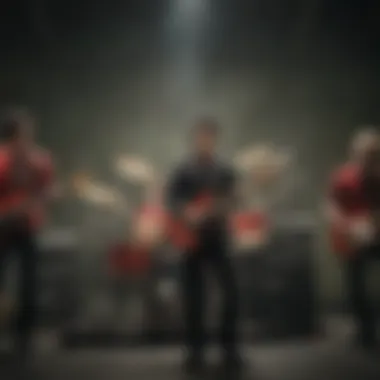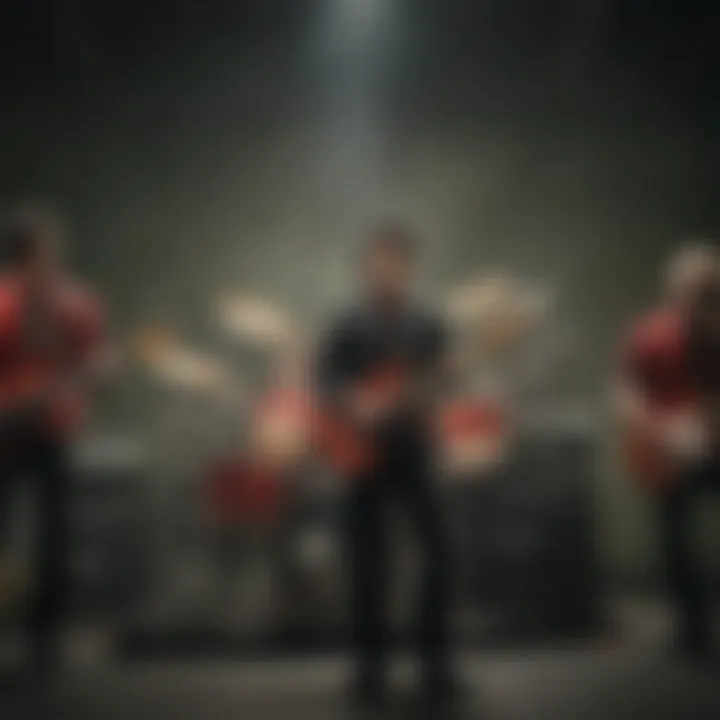Exploring Green Day's BBC Sessions: An In-Depth Analysis


Intro
Green Day has become synonymous with punk rock, captivating audiences with their energy and emotional depth. Their BBC Sessions, a collection of live recordings, offer a unique window into the band's artistic journey. This exploration will dissect the significance of these sessions, highlighting how they showcase Green Day's evolution as a band and their impact on the music landscape.
Through live performances, artists convey more than just notes; they share passion, intention, and a connection to the audience. Green Day's sessions at the BBC are no exception. Each performance is a reflection of the band's growth and a testament to their cultural relevance during the times of recording. By diving into the specifics, we can gain a deeper understanding of their contributions to the genre and examine the layers of meaning behind their music.
Artist Profile
Biography and Background
Green Day was formed in 1986 in Berkeley, California, by Billie Joe Armstrong, Mike Dirnt, and Tre Cool. Initially a local band, they rose to prominence with their major label debut, "Dookie" in 1994, which propelled them into mainstream success. The band's blend of catchy melodies, punk energy, and socially conscious lyrics resonated widely, making them a pivotal part of the punk revival of the 1990s.
Major Influences and Inspirations
Green Day's sound is rooted in a variety of influences. Bands like The Ramones and The Clash shaped their early sound. Armstrong's songwriting is often autobiographical, reflecting his own experiences and societal issues. This combination of personal and political themes has allowed their music to maintain relevance across generations.
Song Analysis
Theme and Lyrics Breakdown
The lyrics in Green Day's BBC Sessions often reflect a sense of rebellion and introspection. Songs like "Boulevard of Broken Dreams" delve into isolation and the search for identity. Their messages frequently resonate with a younger audience grappling with societal pressures.
Instrumentation and Composition
Instrumentation in these live sessions showcases Green Day's punk roots while exploring melodious undertones. The guitar riffs are energetic, and the rhythm section drives the tempo. Each element contributes to an engaging live atmosphere, enhancing the emotional weight of the songs.
The BBC Sessions are not just live recordings; they encapsulate a moment in music history, where raw talent meets cultural context.
In examining Green Day's BBC Sessions, we unravel the depth of the band's artistry and their indelible mark on music history. As we explore the characteristics of these sessions further, we will uncover layers of meaning and impact that continue to influence artists and fans alike.
Prologue
The examination of Green Day's BBC Sessions holds significant weight due to its insights into the band's artistic journey. The BBC Sessions serve as a pivotal component of their discography, shedding light on their live performance abilities and musical evolution. By analyzing these recordings, we can delves into the band's formative experiences and their impact on the music world.
Understanding the nuances of Green Day's live sessions offers numerous benefits. First, it provides a detailed view of how they have developed as musicians over time. Second, it reflects on their cultural relevance during various historical moments. These recordings not only capture the band's sound but also serve as a medium for audience interaction, allowing fans to witness the energy and emotion of live performances.
In summary, the exploration of these sessions is crucial for grasping the depth of Green Day's influence in music history. It emphasizes how live performances shape artistic identity and audience connection, ultimately enriching our appreciation for this renowned punk rock band.
Overview of Green Day
Green Day, formed in 1986, emerged from the punk rock scene in California. The band consists of Billie Joe Armstrong, Mike Dirnt, and Tre Cool. Their rise to fame began with the album "Dookie," which propelled them into mainstream success. They are known for their catchy melodies and engaging lyrics, often addressing social and political themes. Over the years, they evolved both musically and artistically, maturing their sound while still embracing their punk roots. This evolution has solidified their status as influential figures in the music industry.
Purpose of the BBC Sessions
The purpose of the BBC Sessions was multifaceted. Firstly, they aimed to showcase Green Day's talent in a live setting, captured in a high-quality recording environment. These performances allowed fans, many of whom may not have attended concerts, to experience the band's energy and charisma.
Secondly, these sessions served as a platform for the band to present new material and promote their existing work. Live recordings often have a different impact, allowing for a re-imagination of songs. Lastly, the BBC's established reputation for broadcasting significant musical events added an extra layer of prestige to the sessions. They not only document the band's performances but also their presence in the evolving landscape of popular music.
The Significance of Live Performances
Live performances hold a unique position in the study of Green Day’s BBC Sessions, emphasizing the impact these shows have had on both the band and its audience. They serve as a crucial medium through which music transcends the confines of recorded studio versions. The sessions highlight the raw energy and spontaneity often found in live settings, providing listeners with an authentic experience that studio recordings can seldom replicate. This authenticity fosters a deeper connection between the artists and their fan base, reinforcing the idea that music is an experience shared between performer and audience.
Defining Moments in Music History
Green Day’s BBC Sessions are studded with defining moments in music history. These sessions showcase not just the band’s talent but also their contribution to the punk rock genre during a pivotal time in its evolution. The live nature of these recordings creates distinct experiences that resonate with societal undercurrents. Songs like "Boulevard of Broken Dreams" and "Holiday" are delivered with passion, reflecting the emotional states of their respective eras.


Moreover, the BBC has been instrumental in spotlighting music movements, and Green Day’s participation signifies their role within that landscape. The recordings serve as historical artifacts, encapsulating a specific moment when punk rock challenged mainstream norms. Listening to these performances allows fans and scholars alike to trace the shifts in cultural expressions through a dynamic auditory lens.
Connection with Audiences
The connection between Green Day and their audience is palpable in the BBC Sessions. The band engages with fans not merely through the music they play but also through their stage presence and interaction during performances. The sessions capture the essence of live music, where every note is infused with emotion and every lyric serves as a rallying cry for shared beliefs and experiences. This connection facilitates a two-way dialogue, where the band reflects societal issues while also responding to audience sentiments.
The vigor of the live performances contributes to an emotional resonance that recorded music often lacks. Songs performed live reveal vulnerabilities and truths that further solidify the bond with their listeners. This interaction creates memorable moments that are often unreachable through typical album releases.
"Live performances not only showcase talent; they create a communal experience. Green Day’s BBC Sessions exemplify how music can unify and inspire."
Historical Context of the BBC Sessions
Understanding the historical context of Green Day's BBC Sessions is crucial for discerning how these recordings fit into the broader landscape of music during the 1990s and early 2000s. This context lays the groundwork for appreciating not just the band's artistry, but also the dynamics of the music industry itself. The BBC has long stood as a pivotal platform for introducing music to the public; recognizing its role helps explain why these sessions had such a notable impact on Green Day's career.
The BBC's Role in Music Broadcast
The British Broadcasting Corporation (BBC) has played an instrumental role in shaping musical tastes and trends. By providing a space for both established and emerging artists, the BBC has served as a cultural facilitator. Its various programs have featured a range of genres, taking risks on lesser-known acts while also highlighting mainstream successes. This balance has contributed to the BBC's reputation as a critical force in the music industry.
For Green Day, the opportunity to perform on BBC platforms allowed the band to reach a wider, more diverse audience. More than mere broadcasts, these sessions were platforms for the band to showcase their live energy and connect with listeners who could be unfamiliar with their work. This exposure was particularly beneficial during the 1990s when punk rock was gaining momentum, and various subcultures were vying for recognition.
"The BBC's commitment to live music broadcast is unmatched, creating a bridge between artists and their listeners."
Timeframe of Recordings
The timing of Green Day's sessions at the BBC aligns perfectly with their rise in popularity. Their critical breakthrough came with the album Dookie, released in 1994. Following this, live performances began to take on an added significance not only for the band but for the genre of punk rock itself.
The sessions in question took place during a period when punk rock was evolving. The early 2000s marked a shift as the band began to explore more complex themes in their lyrics. It was in this atmosphere that they recorded their notable BBC sessions. Each performance encapsulated the band's development while also reflecting the shifting sociopolitical climate of the time.
This dual focus on personal and societal issues in their music allowed Green Day to resonate with audiences who were facing their own challenges.
In summary, analyzing the historical context of the BBC sessions sheds light on how Green Day positioned itself within the ever-evolving music landscape. Their performances not only celebrate their unique sound but also coincide with critical moments in both musical and social history.
Technical Aspects of the Recordings
Understanding the technical aspects of Green Day’s BBC Sessions is essential in appreciating both the artistry and craftsmanship behind these performances. The quality of recording techniques and sound engineering plays a significant role in how music is experienced by listeners. In the case of Green Day, their BBC sessions provide a unique window into their musical prowess as well as the technical efforts that helped shape their sound during these recordings.
Production Techniques
The production techniques used during the BBC sessions were vital in capturing the raw energy and spontaneity of Green Day’s performances. Traditional methods such as multi-track recording allowed for different instrument layers to be recorded separately. This gave producers greater flexibility in mixing the final tracks.
Key aspects of the production process include:
- Live Recording: The band performed live, which added authenticity and energy to the recordings. Capturing the essence of live music is crucial in making the listener feel connected.
- Microphone Placement: Strategic placement of microphones ensured that each instrument was heard clearly without overwhelming one another.
- Mixing Techniques: The mixing process involved balancing the levels of different instruments and vocals, using compression and equalization, to create a cohesive sound.
These techniques contributed to the overall impact of the recordings, making them resonate well with both critics and fans and highlighting the band’s skill as live performers.
Sound Quality and Engineering
Sound quality is another critical component that defines the reception of Green Day's BBC sessions. The engineering involved not only focused on the immediate sound captured during the recordings but also on how these sounds are presented post-production.
Important points regarding sound quality and engineering include:
- Dynamic Range: The sessions showcased a wide dynamic range which gave life to the music. This variation allowed softer passages to shine equally with louder segments, capturing the intricacies of their performance.
- Analog vs Digital: Many sessions during that time still used analog equipment, known for producing a warm, rich sound that has a unique character.
- Clarity in Instrumentation: The engineering team strived to ensure that each instrument — from the guitars to the drums — maintained clarity. This effort reflected the band’s commitment to sound fidelity.
The careful attention to sound quality and engineering not only enriched the listening experience but also preserved the authentic vibe of Green Day’s raw performances. In essence, the technical aspects of the BBC sessions were integral in translating their live energy into lasting recordings that continue to engage listeners today.
"The BBC sessions are not just a record of performances; they are a testament to the collaboration between artist and engineer in creating something that resonates on many levels."


Analysis of Key Tracks
Highlighted Performances
Green Day's BBC sessions showcase a collection of performances that are crucial to understanding their evolution as a band. The live renditions featured in these sessions not only highlight the band's musicianship, but also their ability to engage with audiences in a compelling manner. Tracks like "Basket Case" and "When I Come Around" stand out during these recordings. These songs capture the essence of their early sound while demonstrating the raw energy that defines their live shows.
When performing "Basket Case," the band effectively combines powerful instrumentals with Billie Joe Armstrong's distinctive vocals. This song reflects the anxiety and disconnection that resonated with many listeners in the early 1990s. The energy during the performance is palpable, drawing audiences in. Additionally, "When I Come Around" offers a different flavor, with its more introspective lyrics paired with an upbeat tempo. The contrast between the two tracks illuminates the band's versatility, ensuring that every performance remains fresh and impactful.
A thorough examination of these highlighted performances reveals how Green Day adapted their sound over time while retaining the core characteristics that garnered them a devoted following. These live sessions not only document the band's trajectory but also serve as a reminder of their significant place in rock history.
Lyrical Themes and Message Delivery
The lyrics delivered in Green Day's BBC sessions often encapsulate themes of disillusionment, social criticism, and personal struggles. Songs such as "American Idiot" and "Good Riddance (Time of Your Life)" feature lyrics that are both stirring and thought-provoking.
In "American Idiot," the band addresses the political atmosphere of the time. The raw emotion evident in Armstrong's delivery communicates a strong sense of urgency and discontent. The live aspect of this performance heightens the impact, allowing the audience to feel the band's frustration with societal issues.
Conversely, "Good Riddance (Time of Your Life)" delves into more personal territory, reflecting on the passage of time and the importance of memories. The simplicity of the arrangement, coupled with poignant lyrics, resonates deeply with listeners, making this performance an emotional highlight.
The way the band fuses their lyrical content with compelling delivery makes these performances memorable. This connection is crucial when analyzing how Green Day's message and themes evolved throughout their career. By examining the lyrical themes and their delivery in these sessions, one gains insight into the band's evolving identity and their ability to reflect the collective sentiment of their audience.
Impact on Green Day's Evolution
Green Day’s BBC Sessions mark a pivotal point in the evolution of the band. These sessions not only showcase their raw musical talent but also reflect significant changes in their artistry and identity. A deep examination reveals how these recordings influenced their sound and style, directly impacting their trajectory in the music industry.
The BBC Sessions served as a platform where Green Day could connect with their audience in real-time while experimenting with their creative output. The importance of these sessions lies in their capacity to highlight the transition of the band from a garage punk outfit to a more refined and accessible rock band. Key songs performed during these sessions often hinted at new musical directions they would later explore in studio albums.
Change in Musical Direction
The change in musical direction evident in these sessions is critical for understanding Green Day’s evolution. During their early years, the band was known for their fast-paced punk sound characterized by simple melodies and catchy hooks. However, the BBC recordings reveal a growing sophistication in their musical approach. Tracks like "Basket Case" and "When I Come Around" demonstrate a shift towards complex arrangements and deeper lyrical content.
The sessions illustrated a willingness to embrace different styles, moving beyond traditional punk rock. They began to incorporate elements from pop, grunge, and even elements of alternative rock, leading to a broader appeal. The importance of this shift can’t be understated; it laid the groundwork for concepts that would later materialize in notable albums like Dookie and American Idiot.
Influence on Subsequent Albums
The influence of the BBC sessions on Green Day’s subsequent albums is profound. Following the recordings, the band embarked on producing Nimrod and Warning, albums which showcased their matured sound and lyrical themes. The experimentation heard in the BBC performances paved the way for the more ambitious project that was American Idiot, a rock opera that blended punk aesthetics with conceptual storytelling.
Tracks performed during the sessions often served as a litmus test for songs that would later be refined and recorded in the studio. The live environment of the BBC sessions helped the band gauge audience reactions, allowing them to adjust their music based on fan engagement. Furthermore, the candid nature of these recordings offered a glimpse into the band’s emotional and political reflections, which ultimately influenced their lyrical choices in subsequent works.
"Understanding the impact of the BBC sessions is crucial to appreciating Green Day's artistic journey. They signify a point where live performance became a canvas for experimentation."
In summary, the impact of the BBC sessions on Green Day’s evolution is multi-faceted. They not only indicated a change in musical direction but also set a precedent for the sound and themes explored in their future albums. As the band grew, so did their willingness to tackle more complex subjects, shaping a new era in their discography.
Cultural Implications of the Sessions
The cultural implications of Green Day's BBC Sessions extend far beyond mere entertainment. These performances offer a lens through which one can observe the intersection of music and societal issues during a particularly volatile time in both politics and culture. Understanding this context helps unlock the significance of the band's choices and their impact on audiences around the world.
Reflections of Societal Issues
Green Day's BBC Sessions serve as a mirror reflecting the societal issues prevalent during their peak years. These sessions arose in an era marked by political turmoil, social upheaval, and an evolving cultural landscape. The band's choice of songs and their lyrical content often addressed themes such as alienation, dissatisfaction with authority, and challenges faced by the youth. In the song "American Idiot," for instance, the band critiqued the media’s role in shaping public opinion and the political establishment's response to the 2003 Iraq war. This honest reflection resonates deeply with listeners, generating conversations about the pressing issues affecting their lives and communities.
Moreover, the energetic yet raw nature of their live performances captures the spirit of rebellion and encourages empowerment among fans. In this way, the sessions provide a platform where societal issues are not only vocalized but also validated. This connection fosters a community of listeners who feel understood and engaged in a dialogue about their realities. As such, Green Day, through their BBC recordings, transcended the role of entertainers to become voices for a generation confronted with significant challenges.
Interaction with Contemporary Politics
The interaction between Green Day's music and contemporary politics is evident in their BBC Sessions. The band has not shied away from addressing politics, making a concerted effort to intertwine their artistic expression with political commentary. This can be seen in their performance of tracks like "Holiday," where the band critiques American foreign policy. By doing so, they not only express their discontent but also encourage fans to reflect critically on political matters.


These sessions capture a unique moment in time where musical discourse engaged directly with the political climate. Green Day's ability to comment on current affairs during their performances demonstrates how musicians can serve as a conduit for dissent, often leading fans to become more politically aware and active.
Additionally, their live performances reached a broader audience via the BBC, making critical messages accessible to many. This visibility contributed to a cultural shift where music became a medium for political expression. The style and substance of Green Day's BBC Sessions show how music can impact political consciousness and address significant topics of the time.
Thus, the sessions not only entertain but provoke thought and action, reinforcing the band's legacy as agents of change within the cultural narrative of their era.
Reception by Critics and Fans
The reception of Green Day’s BBC Sessions is pivotal in understanding the band's artistic journey and significance in the music landscape. Critics and fans provide insights that reflect the band's relevance during and after their sessions. Analyzing both critical acclaim and fan interpretations makes evident the multifaceted impact of these performances. They are not just mere recordings; they serve as touchstones for the band's evolution and interaction with their audience.
Critical Acclaim of the Sessions
Critics have long recognized the BBC Sessions as a significant contribution to Green Day's discography. These performances are often praised for their raw energy and authentic sound. The essence of live performance is embodied not only in the vocal delivery but also in the instrumentation that captures the band’s ethos. Many reviews highlight the technical craftsmanship involved in the recordings. It is noted that the band's choice of songs reflected a keen awareness of their socio-political environment during the recording period.
"Green Day's BBC Sessions caught the band at a pivotal moment, combining youthful exuberance with a clear political message. These tracks remain resonant to this day."
The sessions allowed them to engage directly with listeners, showcasing their evolution while holding on to their punk roots. Critics often point out that these recordings facilitated a bridge between their earlier work and the more polished sounds found in their later albums. Such analysis underscores the transitional nature of these sessions in their career.
Fan Interpretation and Engagement
Fans of Green Day have a deep emotional connection to the BBC Sessions. This is evident through various fan forums and social media discussions. Many fans interpret the lyrics in a personal context, connecting them to their experiences and societal issues. The sessions provided an intimate glimpse into the band's musicianship, which fans cherish.
- Community Engagement: Fans actively discuss their favorite performances from the sessions, often debating the lyrical themes and the emotional weight of the songs.
- Live Experience: The feeling of a live performance translates through the recordings, allowing fans who may not have been present to engage as if they were part of the audience.
Overall, the responses from fans emphasize the sessions' ability to resonate deeply, leading to a lasting appreciation for the band's work. As such, these sessions are more than just music; they represent a shared experience that continues to inspire new generations of listeners.
Legacy of Green Day’s BBC Sessions
The legacy of Green Day’s BBC Sessions is a vital aspect of their overall impact on music. These sessions are more than mere recordings; they encapsulate a moment in time where the band showcased its artistry in a live format, reinforcing its connection with fans and redefining elements of punk rock.
Influence on future musicians is one of the key aspects of this legacy. Green Day set a standard for live performances that resonated beyond their immediate genre. The raw energy, coupled with a polished sound quality, established a benchmark in how punk rock was to be perceived in mainstream music.
Furthermore, these sessions have contributed significant cultural commentary, reflecting the tumultuous social landscape of the times. In their lyrical content and stage presence, Green Day addressed pressing issues that transcended music. This has created an enduring relevance that continues to inspire discussions about activism in music.
Continued Influence on Music Today
Green Day’s BBC Sessions have left a lasting imprint on contemporary music. Many artists draw inspiration from Green Day’s approach to live recording and performance. The session recordings continue to be referenced across various genres, illustrating how punk rock can transcend its roots.
For instance, the authenticity captured during these sessions influences artists to embrace genuine expressions in their music. This empowerment fosters a willingness among musicians to highlight personal and societal issues, resulting in a rich tapestry of modern music that speaks to the current generation. The sessions remind artists of the strength found in vulnerability and social engagement.
Inspiration for Emerging Artists
Emerging artists frequently cite Green Day's BBC Sessions as pivotal in shaping their own artistic endeavors. This influence stems from both the musical style and the thematic boldness present in the band’s performances. Green Day's ability to blend catchy melodies with critical lyrical themes encourages new musicians to explore their own narratives without fear.
Moreover, the accessibility of these sessions makes them invaluable resources for those learning the craft. Aspiring musicians can analyze the way Green Day structures songs and connects with audiences. Understanding these elements aids in developing a distinctive artistic voice.
The End
The conclusion of this article serves as a reflection on the multifaceted impact of Green Day's BBC sessions. It is a crucial element that encapsulate the overarching themes discussed throughout the sections. Understanding this significance provides a holistic view of not only the band's musical journey, but also their wider cultural relevance during their recording periods.
Summation of Key Insights
In summarizing key insights, several important aspects surface. The BBC sessions are not merely live performances; they represent pivotal moments in Green Day’s evolution. Each performance reveals nuances in their sound and lyrical themes that align with societal contexts. The technical prowess demonstrated during the recordings enhances the listening experience, allowing audiences to appreciate the intricacies of their music.
Moreover, the sessions reflect a dialogue between the band and their audience, responding to contemporaneous issues through their art.
"Green Day’s approach in these sessions showcases their ability to blend personal experiences with larger societal themes, marking them as a significant voice in punk rock."
Final Thoughts on Green Day's Impact
Green Day’s influence transcends their music. They have redefined what a punk band can achieve, both sonically and politically. Their BBC sessions highlight this evolution vividly. The interaction with audiences, the technical excellence, and the thematic depth position them uniquely in the annals of music history. As music enthusiasts, aspiring musicians, and students of music engage with these performances, they also engage with a legacy that still resonates today. The sessions echo through subsequent generations, inspiring new artists and enriching the musical landscape.
Understanding these aspects lays groundwork for future explorations, serving not just as a retrospective, but as a guide for future music creation and performance. Overall, the importance of the BBC sessions lies in their ability to capture the zeitgeist of multiple eras while remaining definitive pieces of Green Day's artistic identity.







